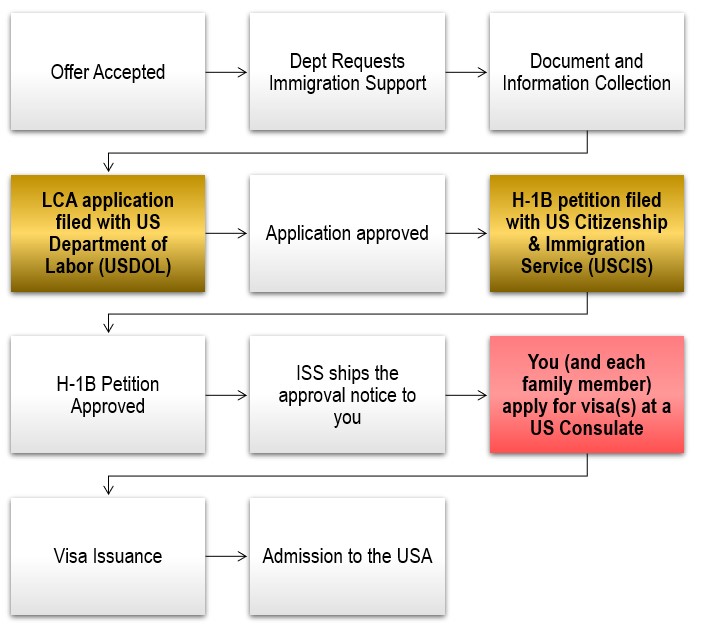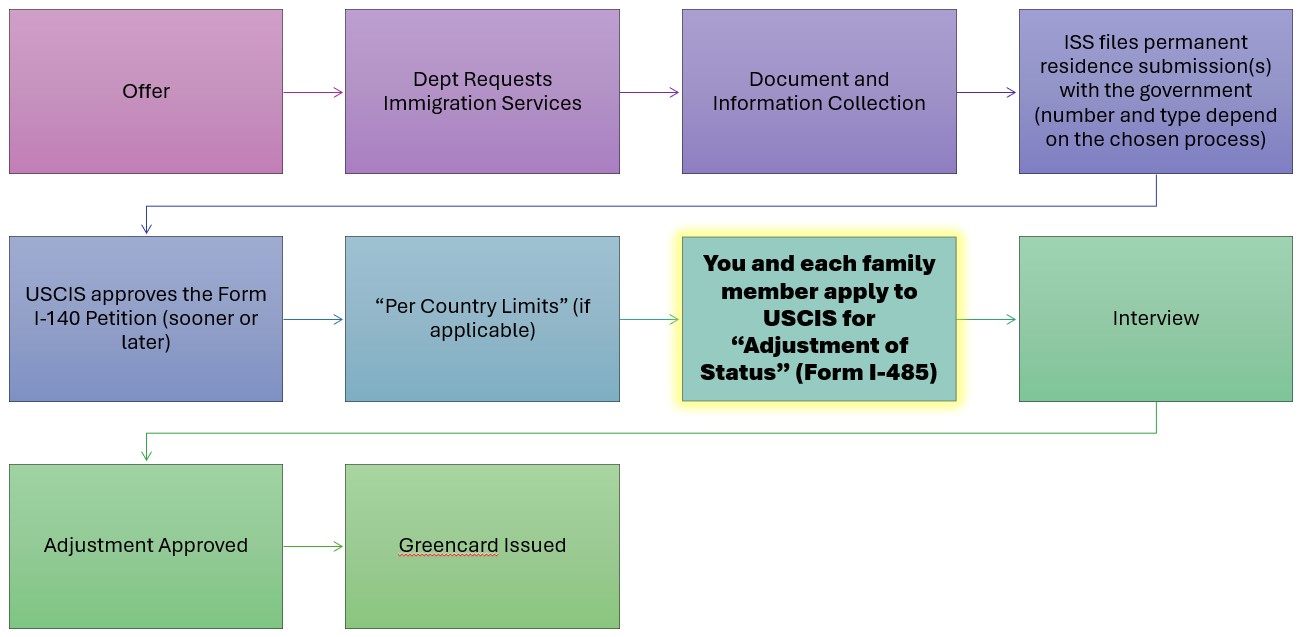

 Immigration services for Purdue employees are provided by Purdue University’s International Scholar Services team.
Immigration services for Purdue employees are provided by Purdue University’s International Scholar Services team.
If you would like a confidential discussion about the immigration services provided to faculty candidates and their family, please schedule a New Faculty Immigration Consultation appointment using our scheduling tool here (or scan the QR code). Note: these consultations are reserved for prospective applicants being interviewed for faculty positions, and for chosen candidates who have accepted faculty offers.
If you are a current faculty member already at Purdue, or you are current staff, postdoc or scholar, please see our contact page for a list of how you may connect with an International Scholar Services team member.
A printable pdf of the information below is here.
International faculty are supported by Purdue through two separate immigration processes:
The two processes occur at roughly the same time; however, like trains on parallel tracks, the two processes do not interact – they are completely separate, arising from different laws and having different requirements.
Information is provided below for informational purposes only. If there are any questions, please do not hesitate to consult with the International Scholar Services Director, Amanda Thompson, as shown above. Our goal is to provide the information and assistance candidates and incoing faculty need to ease this transition.

In general, an individual presents a visa to the US immigration officers at the airport in order to be “admitted” to the USA. Once admitted, the immigration officer grants the traveler a specific “status” and a period of “stay”. Both the visa and status should have the same designation (letters and numbers) – this identifies the relevant immigration law. The status and stay are recorded on an electronic record maintained by the government, called a Form I-94.
For more information about US immigration terminology and travel document explanations, see our discussion about travel documents and terms.
A work “visa / status” is how international faculty are “quickly” provided permission to reside and work in the USA. The H-1B paperwork is a picture of what will happen "now" with respect to the employment activities.
Purdue sponsors most international faculty for H-1B visa status. In limited circumstances, faculty might be sponsored for O-1 status. If the faculty member is interested in O-1 status rather than H-1B, they should make an appointment to speak with Amanda Thompson, Director, International Scholar Services, to outline the reasons why H-1B status is not sufficient to support the faculty member's appointment.
Faculty with tenured or tenure-track appointments may not utilize F-1 OPT (Optional Practical Training), J-1 AT (Academic Training), TN or E-3 status to begin their employment. Those statuses are strictly nonimmigrant, and do not accomodate the indefinite nature of tenured or tenure-track employment. Both US law and Purdue policy prohibits use of those statuses for tenured or tenure-track appointments. If a faculty member is unable, for any rason, to make progress toward H-1B or O-1 status and must use one of the listed, "strictly nonimmigrant" statuses (F-1 OPT (Optional Practical Training), J-1 AT (Academic Training), TN or E-3 status) then the appointment must first be converted to a visiting appointment.
Please scroll down for a workflow image.
For most people, the H-1B process comprises two government requests by Purdue (in the gold boxes below). These two steps are completed within roughly 2 months, in most cases. This internal processing time is dependent on our total caseload, the appointment start date, and the needs of the business unit and faculty member.
If you reside in the USA, the H-1B petition will request your status be changed to H-1B and for your stay to be extended. You are not required to depart the USA and seek re-admission.
If you reside outside the USA, then you (and each accompanying family member) must apply to a US Consulate for a visa (in red, below). If the worker is outside the USA (and not a Canadian citizen), then there is a third government request by the worker themselves (in the red box) at a US Consulate. (Canaidan citizens are exempt from the requirement to obtain visa foils issued by US Consulates.) Processing times by US Consulates of visa stamps can vary widely, but generally range between 1 - 2 months. Please see our discussion of visa applications for more information.
Visa applications focus on the specific situation of each applicant. You are responsible for preparing, submitting and paying for your visa application(s). Purdue does not assist with these. Costs vary from country to country. The base fee is approximately US$190/person, converted to local currency.[1] In some countries, there may also be a reciprocity fee per visa (per person).[2]
Purdue normally requests an H-1B approval period of three years, which is the longest increment permitted by law. This may be extended by further increment(s) of up to three years. Normally, eligibility for H-1B visa status ends after 6 years, which is why Purdue also pursues a greencard for our international faculty. In limited situations, H-1B status may be extended beyond 6 years.

_________________________________________
[1] https://travel.state.gov/content/travel/en/us-visas/visa-information-resources/fees/fees-visa-services.html
[2] https://travel.state.gov/content/travel/en/us-visas/Visa-Reciprocity-and-Civil-Documents-by-Country.html
A greencard also is called US permanent residence. Greencard holders may live and work in the USA indefinitely. Each family member must receive their own greencard. Depending on a person’s situation, there may be several different paths to permanent residence.
For Purdue faculty whose duties include teaching, we utilize an “EB-2” greencard process that comprises four government requests (in gold and red boxes below).[1] It usually is initiated at the same time as the H-1B process. However, where the H-1B process is completed within 6 months, the permanent residence process stretches out for up to 2 - 3+ years. Depending on timing, it may be necessary to extend H-1B status before the greencard is issued. The greencard replaces H-1B (and H-4) status by authorizing ‘indefinite’ residence and work in the USA.
The first three government submissions (in gold, below) focus on the employment at Purdue, and the faculty member’s qualifications for that employment. As a result, Purdue coordinates and pays for these three steps.

______________________________________
[1] EB-2 means “Employment-Based Second Preference”. Purdue utilizes a sub-category of this process, for ‘Advanced Degreed Professionals’.
US law creates a bottleneck in the permanent residence process by limiting the number of greencards that may be attributable to any given nation (based on the applicants’ country of birth).[1] The result of these “Per Country Limits” is there are more greencard requests each year than permitted by law for applicants born in one of seven highly populous countries.[2] Per-country limits (shown in a grey box with white text, above) delay only the filing of the Adjustment application; they do not affect any other part of the greencard process.
Faculty born in China may face a delay of up to two - four years before they may submit their Adjustment applications; faculty born in India may face a delay of up to ten or more years. This is longer than the 6 years H-1B status normally is available, but the law provides an exception in these circumstances: H-1B status may be extended in three-year increments for as long as per-country limits prevent the filing of the Adjustment application. Faculty whose greencards are delayed by these per-country limits are thus able to continue working throughout their wait.
__________________________________________
[1] The law focuses solely on country of birth, and does not consider after-acquired citizenship. It is, however, possible to ‘adopt’ the country of birth of one’s spouse. For example, if an Indian national and Canadian national were married, permanent residence could be processed as if both were born in Canada.
[2] India, China, Mexico, Philippines, El Salvador, Guatemala, Honduras. See https://travel.state.gov/content/travel/en/legal/visa-law0/visa-bulletin.html
Certain faculty may prefer to pursue a greencard through the “EB-1” process for “Outstanding Professors / Researchers”. Reasons for this include:
To qualify, the faculty member must have extensive, documented impact and accomplishments within the field. Not every faculty member (or researcher) meets the legal threshold for the EB-1B case.
EB-1 cases are assigned to Purdue’s immigration law firm, under ISS coordination. These cases requires a significant investment of time and effort by the faculty member (unlike EB-2 case, where ISS does almost all of the work). EB-1 cases are also inherently more risky than EB-2 cases; for an EB-1 case to succeed, the USCIS must agree that faculty member is “outstanding”, but for an EB-2 case to succeed, we merely must show an advanced degree.
Faculty who are interested in the EB-1 process should discuss this with their departments. Because of the significant risk, cost and time investment, EB-1 processes are pursued only when truly needed.
If the department confirms that it is willing to sponsor EB-1B permanent residence, this is in addition to EB-2 permanent residence processing. The EB-1B process is, as noted above, inherently risky, and the USCIS can and does deny petitions. The EB-2 process is, in contrast, far more reliable and less prone to denials. Accordingly, Purdue policy is that the EB-2 process must continue until and unless there is a Purdue-filed EB-1B approval in hand.
Once a department confirms willingness to sponsor EB-1B permanent residence:
The final step is Adjustment of Status (in red, below).
Each family member must submit an Adjustment of Status application to receive their greencard and acquire US permanent residence. Adjustment focuses on the personal circumstances of each applicant. As a result, faculty are responsible for preparing, submitting and paying for their Adjustment application(s). Purdue does not assist.
Costs for filing Form I-485 Adjustment are (a) US$1,225 for each applicant between 14 and 78 years old; and (b) US$750 for each applicant under 14 years old. Please see the USCIS website for more information.
We generally strongly recommend that faculty hire a qualified immigration attorney to assist with the Form I-485 Adjustment of Status filing, when they are eligible. Attorney fees to assist with Adjustment may range from $500 / person (for document review) to $1,500+ per person for full services. ISS can provide information on how to find a qualified immigration attorney on request.

Spouses and unmarried children under 21 years old receive H-4 visa status, which permits residence in the USA and attendance at school, but not employment.[1] However, they may request a work permit once the I-140 petition[2] is approved, which usually occurs within 18 – 36 months of arrival in the USA. Additionally, H-4 spouses and children may request work permits when the Adjustment application is submitted. Currently, a work permit application costs US$410. These applications focus on the applicant (spouse or child), so Purdue does not assist. Please see the USCIS website for more information.
If you are in the USA and have family, you may need to prepare a request to change and extend their status and stay. This request focuses on the personal circumstances of your family members. As a result, Purdue does not prepare or pay for this, although we do provide a detailed guide about how to complete the I-539, during the preparation of the H-1B petitition. The USCIS has a Fee Calculator to help applicants calculate the cost of the I-539 application.
_____________________________________
[1] If your spouse wants to work in the USA, contact Purdue’s Faculty Dual Career and Relocation Services (https://www.purdue.edu/hr/hiring/dualcareer/). The assigned specialist will help identify employment opportunities. Depending on the situation, spouses may need their own H-1B.
[2] This is the third gold request in the permanent residence process flow, under Step Two: Permanent Residence, above
The International Scholar Services team offers two immigration presentations each September and January:
The International Scholar Services office supports the immigration requests for incoming international faculty who require immigration sponsorship for the Purdue employment.
How do you, the candidate, know whether you require immigration sponsorship for your new Purdue appointment?
No. F-1 status is strictly nonimmigrant and does not permit employment within an appointment that is intended to be indefinite in duration. Optional Practical Training (OPT) is a benefit of F-1 status so you still hold F-1 status when you utilize OPT. If a candidate for a tenured, tenure-track, or clinical faculty appointment, or for an appointment as a professor of practice, intends to utilize their F-1 Optional Practical Training (OPT) to authorize their employment at Purdue, the appointment will be converted to a visiting scholar appointment with commensurate adjustment of wages and benefits.
Please note: the offer issued to the candidate for these appointments specifically requires that the candidate hold H-1B, O-1 or similar 'dual intent' immigration status that permits the pursuit of both an immediate work permission and permanent residence.
Please reach out to ISS (intlscholars@purdue.edu) to initiate assistance.
Yes, F-1 OPT may be used to support the employment at Purdue.
No. J-1 status is strictly nonimmigrant and does not permit employment within an appointment that is intended to be indefinite in duration. If a candidate for a tenured, tenure-track appointment intends to transfer or use J-1 (or J-2) status to authorize their employment at Purdue, the appointment will be converted to a visiting scholar appointment with commensurate adjustment of wages and benefits.
Please note: the offer issued to the candidate for any of these appointments specifically requires that the candidate hold H-1B, O-1 or similar 'dual intent' immigration status that permits the pursuit of both an immediate work permission and permanent residence.
Please reach out to ISS (intlscholars@purdue.edu) to initiate assistance.
Yes, J-1, J-2 or J-1 Academic Training may be used to support the employment at Purdue.
No.
TN status is strictly nonimmigrant and does not permit employment within an appointment that is intended to be indefinite in duration. If a candidate for a tenured, tenure-track, or clinical faculty appointment, or for an appointment as a professor of practice, intends to transfer or use TN status to authorize their employment at Purdue, the appointment will be converted to a visiting scholar appointment with commensurate adjustment of wages and benefits.
Please note: the offer issued to the candidate for any of these appointments specifically requires that the candidate hold H-1B, O-1 or similar 'dual intent' immigration status that permits the pursuit of both an immediate work permission and permanent residence.
Additionally, while the process of obtaining admission to the USA in TN status might appear to be simple enough for a candidate to complete on their own, that border process does NOT satisfy Purdue's larger obligations as the employer of the foreign worker. The request for immigration authorization MUST go through the ISS office to ensure these corollary obligations also are met.
Please reach out to ISS (intlscholars@purdue.edu) to initiate assistance.
No.
TN status may be used to support these appointments, BUT the request must be submitted through ISS and ISS must generate the required paperwork for admission.
While the process of obtaining admission to the USA in TN status might appear to be simple enough for a candidate to complete on their own, that border process does NOT satisfy Purdue's larger obligations as the employer of the foreign worker. The request for immigration authorization MUST go through the ISS office to ensure these corollary obligations also are met.
Please reach out to ISS (intlscholars@purdue.edu) to initiate assistance.